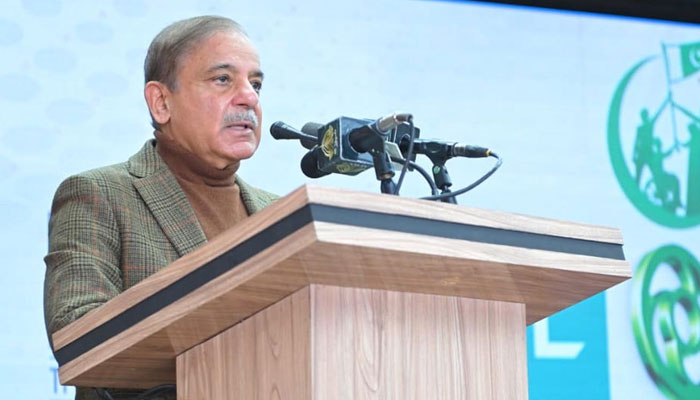Some major austerity measures pertaining to judges, MPs, bureaucrats ignored
National Austerity Committee recommended maximum pension be capped by Rs500,000 a month in all cases
ISLAMABAD: Some major recommendations of the National Austerity Committee concerning judges, MPs and bureaucrats have been ignored by the Shehbaz Sharif government while it announced last week the implementation of several other suggestions.
The National Austerity Committee (NAC) had recommended that maximum pension should be capped by Rs500,000 a month in all cases. This recommendation was primarily meant to reduce the pension of retired judges of the high courts and Supreme Court.
Last week’s announcement of austerity measures did not include the reduction of pension for judges. Instead the prime minister and the cabinet, however, left it for the Chief Justice of Pakistan to take austerity measures in his institution.
The prime minister announced that none of his cabinet members will draw any salary and will pay the utilities’ bills from their own pocket, the NAC had proposed that the Cabinet should consist of a maximum of 30 members.
The Austerity Committee had also sought 15 percent cut in salaries and allowances of all legislators including MNAs, Senators and MPAs but the cabinet did not decide about this.
Similarly, the Committee had recommended reduction in all allowance(s) specific or admissible for any post, organisation or cadre by 25 percent till June 2024. It was clarified by the NAC that this would not apply to general allowances like house rent allowance, medical allowance and conveyance allowance. The cabinet did not approve this reduction.
It was also recommended that all perks of retired civil servants, judicial officers of superior courts and of uniformed services viz vehicles, security, support staff and utilities may be withdrawn but here too the cabinet did not decide about its implementation.
It was also proposed by the NAC that the existing system of identification of development projects through public representatives (MNAs, MPAs and Senators) in place since 1985 be done away with. It was suggested that in its place, sectoral growth strategies may be adopted, expecting that this change would improve the quality of spending in terms of project preparation and approvals. The cabinet did not approve this proposal.
It was also suggested that units of free electricity allowed to employees of power distribution companies be monetised but the last week government announcement of austerity measures also did not include this point.
The cabinet at this stage also ignored taking decisions regarding proposals submitted about the state-owned enterprises (SOEs). It was pointed out by the NAC, business/ commercial activity is not the function of the government. Therefore, SOEs carrying out commercial activities may be shifted to other arrangements; strengthen SOE governance through implementation of SOE law, and discontinue subsidies to SOEs which do not provide any public good.
The government also ignored the NAC proposal that no new greenfield projects should be included in PSDP except for those related to water, energy, climate change and pro-poor projects. According to government sources, such proposals relating to the budget are likely to be included in the next budget.
It was also recommended that ongoing and approved development projects may be reviewed and only the most important and unavoidable/feasible projects may be processed further for completion.
The Planning Division was recommended to carry out a comprehensive review of the development projects in order to ensure that the federal government should fund only those development projects which come under its constitutional jurisdiction. The projects which come under the purview of provinces should be funded by respective provincial governments. This matter was also not decided in the last week cabinet meeting which had approved a set of austerity measures aimed at saving Rs200 billion per annum.
The entire package of austerity measures as was submitted by the NAC- which concerned federal and provincial government, defence and judiciary- if fully implemented is expected to save up to Rs1,000 billion per annum in the medium and long term.
-
 Gwyneth Paltrow Discusses ‘bizarre’ Ways Of Dealing With Chronic Illness
Gwyneth Paltrow Discusses ‘bizarre’ Ways Of Dealing With Chronic Illness -
 US House Passes Resolution To Rescind Trump’s Tariffs On Canada
US House Passes Resolution To Rescind Trump’s Tariffs On Canada -
 Reese Witherspoon Pays Tribute To James Van Der Beek After His Death
Reese Witherspoon Pays Tribute To James Van Der Beek After His Death -
 Halsey Explains ‘bittersweet’ Endometriosis Diagnosis
Halsey Explains ‘bittersweet’ Endometriosis Diagnosis -
 'Single' Zayn Malik Shares Whether He Wants More Kids
'Single' Zayn Malik Shares Whether He Wants More Kids -
 James Van Der Beek’s Family Faces Crisis After His Death
James Van Der Beek’s Family Faces Crisis After His Death -
 Courteney Cox Celebrates Jennifer Aniston’s 57th Birthday With ‘Friends’ Throwback
Courteney Cox Celebrates Jennifer Aniston’s 57th Birthday With ‘Friends’ Throwback -
 Camila Cabello Shares Update On Her Hair Two Years After Going Platinum
Camila Cabello Shares Update On Her Hair Two Years After Going Platinum -
 Prince William Steps In To Help Farmer's Awareness Mission
Prince William Steps In To Help Farmer's Awareness Mission -
 Queen Elizabeth Tied To Andrew's Sexual Abuse Case Settlement: Report
Queen Elizabeth Tied To Andrew's Sexual Abuse Case Settlement: Report -
 Mark Ruffalo Urges Fans To Boycott Top AI Company Boycott
Mark Ruffalo Urges Fans To Boycott Top AI Company Boycott -
 Prince William Joins Esports Battle In Saudi Arabia
Prince William Joins Esports Battle In Saudi Arabia -
 Princess Beatrice, Eugenie Are Being Ripped Apart: ‘Their Relationship Is Fully Fractured’
Princess Beatrice, Eugenie Are Being Ripped Apart: ‘Their Relationship Is Fully Fractured’ -
 Arden Cho Shares Update On Search For ‘perfect’ Wedding Dress Ahead Of Italy Ceremony
Arden Cho Shares Update On Search For ‘perfect’ Wedding Dress Ahead Of Italy Ceremony -
 Ariana Madix Goes Unfiltered About Dating Life
Ariana Madix Goes Unfiltered About Dating Life -
 Prince William Closes Saudi Arabia Visit With Rare Desert Shot
Prince William Closes Saudi Arabia Visit With Rare Desert Shot




